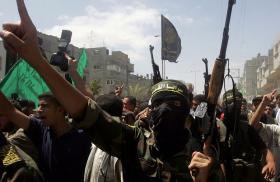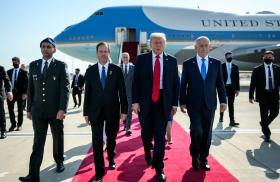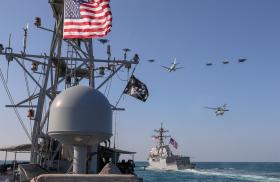In September 2000, the Palestinians made a strategic decision to abandon the Oslo process and prepare the groundwork for a struggle with Israel, which was to be conducted by means of terror and violence. Two years later, the armed conflict persists, and the Palestinian Authority (PA) continues to finance and support terror factions. Despite this fact, Israel continues to search for a negotiating partner while attempting to protect its citizens. Negotiations, however, necessitate a new Palestinian leadership that is willing to fight terror, as well as interim agreements adhered to by both sides.
Moreover, although America's potential invasion of Iraq is solely an American decision, such action would have far-reaching implications for the Israeli-Palestinian conflict, especially if Iraq were to draw Israel into a war.
Palestinian Terror and Israel's Response
After rejecting Prime Minister Ehud Barak's proposals at Camp David, the PA instigated a war of terror on Israel in what it perceived to be the "last campaign." Motivated by a seemingly successful campaign of Hizballah terror following Israel's unilateral withdrawal from southern Lebanon, the PA chose the Hizballah model to achieve one of its main goals: forcing Israel to withdraw from the Palestinian territories.
Combining their international image as "victims" with what they hoped would be a fatigued Israeli society, the Palestinians attempted to use terror—specifically, suicide bombings—to achieve their ultimate goal, a Palestinian state in all of the post-1967 borders. This has been evidenced through several discoveries showing that Chairman Yasir Arafat and the PA's leadership have always intended to wage an armed conflict. For one thing, Arafat's refusal to accept the final deal offered to him at Taba shows that he is not a serious peace partner. Moreover, there is documented proof linking both Arafat and the PA to the various Palestinian terror factions, particularly in terms of financing and weapons smuggling.
The Palestinian terror campaign has been carried out primarily against the Israeli public, killing over 600 Israelis at present count. The Israelis responded, and continue to respond, through patrols, roadblocks, surveillance, targeted assassinations, and, most important, Operations Defensive Shield and Determined Path, which sought to destroy the roots of terror in the West Bank and show that terrorists cannot seek refuge anywhere. These operations were largely successful.
Moving Back to the Negotiating Table
After two years of conflict, the Palestinians have learned a very important lesson: violence cannot achieve political goals. This lesson has been seared into their collective conscience. As more Palestinians come to this realization, it may be possible to resume negotiations in the near future. The Palestinians are at a crucial point; Arafat is clearly losing power, and they must now choose a leadership that will implement real reforms and negotiate a peace deal with Israel. The most critical reform would be the PA's commitment—both verbal and actual—to prevent terror. Once terror has been stopped, negotiations will resume.
The ongoing campaign of suicide bombings and attempts is taking a heavy toll on innocent Palestinian as well as Israeli civilians. The Israeli government is trying to ease the suffering of the Palestinian people, but when the security of Israelis is on the line, certain measures must be taken. Terror cells are hiding and operating in Palestinian cities; because Arafat chooses to do nothing about this situation, the Israeli army must occupy and operate in these cities to defend its own people, causing a great inconvenience for the Palestinian people. Israel does not want to be in the West Bank, but until the Palestinians themselves fight terror, Israel will remain.
The key is to rebuild the lost trust between the two sides. First, a new Palestinian leadership with a real commitment to peace and reform must assume power. Once this takes place, a series of interim agreements must be implemented, and both sides must follow them literally and step by step. The two years of violence have reopened a large gap between Israelis and Palestinians, and although closing this gap will take a long time and considerable work, it can be done. The PA cabinet's resignation on September 11, 2002, is a positive sign and a step in the direction of reform.
Implications of an American Strike on Iraq
Israel does not wish to become involved in any U.S. conflict with Iraq. Nevertheless, the overthrow of Saddam Hussayn's regime and the establishment of a government more comfortable for the United States could lead to deep positive change and stability in the regional balance of power, assuming Iraq's territorial integrity were maintained.
In addition, such an outcome would contribute much to the war on terrorism. A U.S. strike on Iraq would send a clear message to Syria, Lebanon, Iran, and the Palestinian terror factions that terrorism is unacceptable and that it will be attacked at its roots. Hopefully, these countries (and the Palestinians in particular) will not take advantage of such a strike to further their own goals against Israel.
The possibility that the war on terror might target Syria and Iran in the future could help to curtail the support bases of terror, reducing the practical aid provided by the foreign leadership of Hamas and Islamic Jihad. Meanwhile, on the northern front, Hizballah could be expected to take advantage of action against Iraq by attempting to escalate its conflict with Israel. Iran and Syria's willingness to restrain Hizballah would largely depend on the potency of American messages to Damascus and Tehran prior to a campaign against Iraq, as well as on the success of the campaign itself. If the United States presses its full weight on these regional players, Israel can stay out of the conflict with Iraq as much as possible.
In the event of a U.S. strike against Iraq, Israel's most immediate concerns would be the potential for Iraqi attacks against Israel and the possibility that such attacks would employ nonconventional weapons. In either case, Israel reserves the right to protect itself.
This Special Policy Forum Report was prepared by Dan Feferman.
Policy #400


